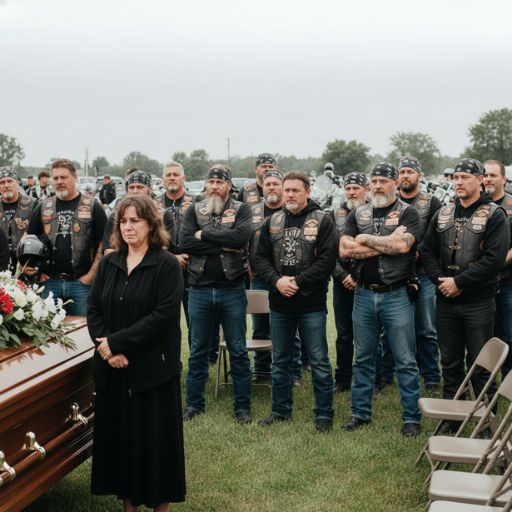She had pictured countless ways in which burying her husband would break her heart, never imagining that something entirely unexpected would shake her that morning. Outside the church, the sudden thunder of engines pierced the quiet, making her chest tighten and her breath catch.
Just two days earlier, after filing a standard police report for George’s missing Harley, Maria had whispered to herself, almost as if saying it aloud could make it disappear forever, “I just want George’s bike back.” That motorcycle had been more than a possession; it was the object of his devotion, cared for with more attention than anything else. Every Sunday without fail, he polished it until it gleamed, as if tending to it were a sacred ritual. But when Maria told the authorities it was stolen, they barely blinked—other matters, they said, took priority.
At the funeral, the church doors creaked, and ten men in leather stepped inside, boots heavy against the wooden floor. Every head turned, murmurs spreading among the mourners. They looked like old friends, perhaps riding companions paying their respects. But their movements were precise, their eyes scanning the room with a vigilance that stilled the air—not sorrow, but watchfulness.
One of them, tall and formidable, with a jagged scar running down his jaw, approached the coffin. He set something atop it. Maria froze, gripping her handbag tightly, unable to believe what she was seeing. It wasn’t a floral tribute or a condolence card—it was the missing motorcycle key.
A collective breath seemed to stop in the chapel. The man met Maria’s gaze, not in sympathy, but with quiet confirmation, as though a sacred duty had been fulfilled. Without another word, the bikers turned, boots clanging as they exited into the sunlight. Silence returned, heavy and suffocating, until a tentative whisper rose: “Was that… the key?”
Maria didn’t answer. Trembling, she stepped forward and lifted the small, familiar key. A worn leather tassel hung from it, initials burned into the metal: “G.M.”—George’s unmistakable mark. Simple yet profound, it carried the weight of their shared life and the memories she had been clinging to without realizing it.
Later, at her kitchen table, Maria sat with a glass of sherry, staring blankly. Shadows of grief lingered in every corner. “They knew something,” she finally murmured. “Those men… they weren’t just here to mourn.”
“No, I don’t think they were,” I replied softly.
“They returned the bike,” she said, her certainty cutting through the haze of sorrow.
The next morning, at six-thirty, her shaky voice came over the phone. “It’s back,” she whispered.
“Back? What do you mean?” I asked groggily.
“The Harley. It’s in the driveway,” she breathed, disbelief and awe threading her words.
I hurried over, still in pajamas, and there it was—gleaming in the early sunlight, pristine, untouched, as if the world had paused just for it. The kickstand down, helmet in its usual place—it was George, tangible again in a single object.
Under the seat, a neatly folded note awaited her, written in careful handwriting with no addressee:
“He was one of ours. We take care of our own. Tell the widow: ‘He rode with honor.’ — MB”
“MB?” I asked aloud.
Maria swallowed hard. “George never rode with anyone. He always warned me about biker gangs.”
Yet old photographs in dusty attic boxes told a different story: George, younger, standing proudly among men in leather vests, each adorned with patches. One patch repeated: a red falcon encircled by a black chain under the letters “MB.”
The Midnight Brotherhood. Not exactly a gang, not exactly a club—a fellowship bound by loyalty, honor, and unspoken codes. George had lived by their principles, quietly protecting and caring for those he considered family.
In the weeks that followed, small, unexpected acts of kindness appeared: roof repairs, groceries, security systems—all signed with the same initials, each a silent tribute to George’s life beyond what Maria had known.
Eventually, a young man named Terry arrived. Clean-cut, nervous, almost out of place among the rugged bikers, he spoke with reverence about her husband: the promises George had kept, the debts of loyalty he had earned, the lives he had safeguarded. Those debts were now being repaid.
The stolen Harley, taken by a petty thief unaware of the Brotherhood’s reach, had returned with a message: George’s life, lived with honor and integrity, mattered still.
Months later, Maria hosted a cookout for the Brotherhood. They arrived bearing food and beer, quiet and respectful, celebrating the man she had loved. Scar-Jaw, the biker who had left the key on the coffin, explained why George had hidden this world from her: he wanted her to live peacefully, free from the complications of his past.
That evening, Maria realized she had gained more than answers—she had gained a family, guardians of George’s memory, protectors of her present and future.
And the Harley, once a symbol of speed and freedom, had transformed into a symbol of loyalty, heroism, and continuity. On its tank, a small decal now read: “For the Widow—We Ride.”
Maria finally understood she was never truly alone. George’s love, his honor, and the Brotherhood’s devotion ensured that.
Sometimes, loyalty and courage appear long after they are needed—sometimes on roaring engines, in leather vests, carrying a silent promise: love, steadfast and unyielding, never truly dies.
Because when a life is lived with honor, it is remembered. And sometimes, others ride in your place.
